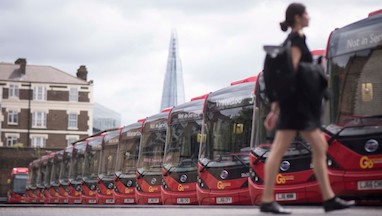Newcastle-headquartered international rail and bus giant Go-Ahead Group said on Thursday its revenue rose 6.1% to £3.89 billion in the year to June 27.
Go-Ahead said the increase was “primarily attributable to additional revenue generated by UK rail franchises and the introduction of new contracts, partially offset by the impact of the COVID-19 crisis on the group.”
The company reported a loss before tax of £200,000 (2019: £97.0m profit) that included £57.1 million of exceptional items “and reflects the impact of COVID-19 on our regional bus business and the losses in the German rail business.”
Profit attributable to shareholders — excluding exceptional items — fell by £50.6 million or 69.5% to £22.2 million.
Go-Ahead’s share price has fallen about 70% over the past 12 months.
Go-Ahead Group’s rail division operates two franchises in the UK, three contracts in Germany and one in Norway.
In the UK, its Southeastern and GTR (Govia Thameslink Railway) franchises operate through its 65% owned subsidiary, Govia, which is 35% owned by Keolis.
In his outlook, Go-Ahead CEO David Brown said: “We are in a very different place today than we were during the period of national lockdown in the UK.
“Services are now running at around 90 per cent of pre-COVID-19 levels in our regional bus businesses, carrying 50 to 60 per cent of typical passenger journeys, and around 90 per cent of our UK rail services are now in operation.
“However, the coming months remain uncertain for us all.
“Due to this uncertainty, we are unable to reinstate meaningful financial guidance for our regional bus business for the 2021 financial year.
“Instead, we are considering a range of scenarios and the associated potential impact on the division, set out on pages 60 to 62 of 2020 Annual Report and Accounts.
“The contracted nature of the remainder of the business provides greater visibility of future financial performance.
“For the 2021 financial year, we expect our London & International bus division to generate operating profit similar to that delivered in 2020.
“Our rail division is expected to deliver a breakeven operating performance.
“The aftermath of the pandemic will undoubtedly present us with challenges.
“We may see increasing levels of home working, more online medical appointments and fewer international trips, all of which could impact demand for our services.
“However, we may see more domestic holidays, more people moving out of cities and commuting from the countryside and more activity in our local communities, with more home-workers shopping close to home and socialising in their local towns and cities.
“We will adapt to evolving trends and will strive to maximise the arising opportunities. It is important that we take forward the strengths we have displayed so well throughout the crisis and become even more agile, more innovative and more collaborative.”
Go-Ahead said it is committed to the resumption of dividend payments when appropriate.
CEO Brown added: “Our financial results for the year have been significantly impacted by the pandemic despite only four months of the crisis period falling within our financial year.
“Ninety percent of Go-Ahead revenues are secured through contractual arrangements, largely comprising revenues from our London & International bus business and UK rail franchises.
“While our German rail contracts have not been materially impacted by the crisis, this business continues to face significant operational and commercial challenges associated with the delayed delivery of trains and driver shortages.
“Through management action, we have seen operational performance improve and we have a clear plan to deliver profitability over the medium term.
“Our regional bus business has been heavily impacted by the crisis as the number of passengers travelling on our services reduced significantly in March as a result of lockdown restrictions.
“While we hope to be operating under more normal circumstances as soon as possible, we welcome the vital financial support that these services receive through government funding until passenger numbers recover.
“We are pleased to see more and more people travelling on our buses and train …”
